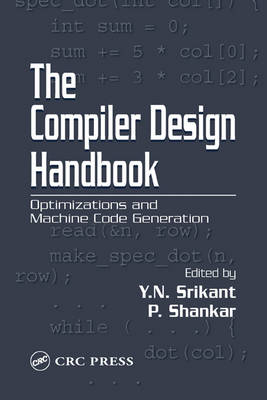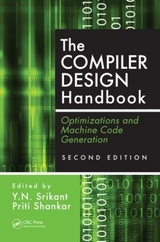
The Compiler Design Handbook
Crc Press Inc (Verlag)
978-0-8493-1240-3 (ISBN)
- Titel erscheint in neuer Auflage
- Artikel merken
The widespread use of object-oriented languages and Internet security concerns are just the beginning. Add embedded systems, multiple memory banks, highly pipelined units operating in parallel, and a host of other advances and it becomes clear that current and future computer architectures pose immense challenges to compiler designers-challenges that already exceed the capabilities of traditional compilation techniques.
The Compiler Design Handbook: Optimizations and Machine Code Generation is designed to help you meet those challenges. Written by top researchers and designers from around the world, it presents detailed, up-to-date discussions on virtually all aspects of compiler optimizations and code generation. It covers a wide range of advanced topics, focusing on contemporary architectures such as VLIW, superscalar, multiprocessor, and digital signal processing. It also includes detailed presentations that highlight the different techniques required for optimizing programs written in parallel and those written in object-oriented languages. Each chapter is self-contained, treats its topic in depth, and includes a section of future research directions.
Compiler design has always been a highly specialized subject with a fine blend of intricate theory and difficult implementation. Yet compilers play an increasingly vital role in the quest for improved performance. With its careful attention to the most researched, difficult, and widely discussed topics in compiler design, The Compiler Design Handbook offers a unique opportunity for designers and researchers to update their knowledge, refine their skills, and prepare for future innovations.
Dataflow Analysis, Uday Khedkar, Indian Institute of Technology, Bombay, India
Automatic Generation of Code Optimizers from Formal Specifications, Vineeth Kumar Paleri, Regional Engineering College, Calicut, India
Scalar Compiler Optimizations on the SSA Form and the Flowgraph, Y.N. Srikant, Indian Institute of Science, Bangalore India
Profile-Guided Compiler Optimizations, Rajiv Gupta, University of Arizona, USA, Eduard Mehofer, Institute for Software Science, Austria, and Youtao Zhang, University of Arizona, USA
Shape Analysis and Applications, Reinhard Wilhelm, Universitaet des Saarlandes, Germany, Thomas Reps, University of Wisconsin-Madison, USA, and Mooly Sagiv, Tel Aviv University, Israel
Optimizations for Object-Oriented Languages, Andreas Krall, Inst. fur Computersprachen, Austria and Nigel Horspool, University of Victoria, BC, Canada
Data Flow Testing, Rajiv Gupta and Neelam Gupta, University of Arizona, USA
Program Slicing, G. B. Mund, D Goswami and Rajib Mall, Indian Institute of Technology, Kharagpur, India
Debuggers for Programming Languages, Sanjeev Kumar Aggarwal and M Sarath Kumar, Indian Institute of Technology, Kanpur, India
Dependence Analysis and Parallelizing Transformations, Rajopadhye, Colorado State University, USA
Compilation for Distributed Memory Architectures, Alok Choudhary, Northwestern University, USA and Mahmut Kandemir, Pennsylvania State University, USA
Automatic Data Distribution, J. Ramanujam, Louisiana State University, USA
Register Allocation, K. Gopinath, Indian Institute of Science, Bangalore, India
Architecture Description Languages for Retargetable Compilation, Sharad Malik and Wei Qin, Princeton University, USA
Instruction Selection using Tree Parsing, Priti Shankar, Indian Institute of Science, Bangalore, India
A Retargetable VLIW Compiler Framework for DSPs, Sharad Malik and S. Rajagopalan, Princeton University, USA
Instruction Scheduling, R. Govindarajan, Indian Institute of Science, Bangalore, India
Software Pipelining, Vicki H. Allan, Utah State University, USA
Dynamic Compilation, Evelyn Duesterwald, Hewlett Packard Laboratories, USA
Compiling Safe Mobile Code, R. Venugopal, Hewlett-Packard India Software Operation Ltd., India and Ravindra B. Keskar, Sasken Communication Technologies Ltd., India
Type Systems in Programming Languages, Ramesh Subrahmanyam, Burning Glass Technologies, USA
An Introduction to Operational Semantics, Sanjeeva Prasad and S. Arun Kumar, Indian Institute of Technology, Delhi, India
| Erscheint lt. Verlag | 25.9.2002 |
|---|---|
| Zusatzinfo | 468 equations; 44 Tables, black and white; 352 Illustrations, black and white |
| Verlagsort | Bosa Roca |
| Sprache | englisch |
| Maße | 178 x 254 mm |
| Gewicht | 1792 g |
| Themenwelt | Schulbuch / Wörterbuch ► Lexikon / Chroniken |
| Mathematik / Informatik ► Informatik ► Programmiersprachen / -werkzeuge | |
| Informatik ► Theorie / Studium ► Compilerbau | |
| Naturwissenschaften | |
| Technik | |
| ISBN-10 | 0-8493-1240-X / 084931240X |
| ISBN-13 | 978-0-8493-1240-3 / 9780849312403 |
| Zustand | Neuware |
| Haben Sie eine Frage zum Produkt? |
aus dem Bereich



